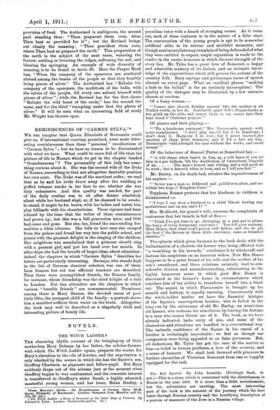NOVELS.
THE WITCH LADDEKt THE charming idyllic account of the bringing-up of little motherless Mary Dolman by her father, the scholar-farmer, with which The Witch Ladder opens, prepares the reader for Mary's elevation to the role of heroine, and the expectation Is only whetted by the scenes in which she has the Squire's son, Geoffrey Charteris, as playmate and fellow-pupil. But Mary suddenly drops out of the scheme just at the moment when Geoffrey begins to wax sentimental, and the romantic interest is transferred to Geoffrey's sister Sarah, a highly educated, masterful young woman, and her lover, Brian Dudley, a *Prom Memory's Shrine : the Reminiscences of Carmen Slava (H.M.. Queen Elizabeth of Roumania). London: Sampson Low, Marston and Co. [108. 6d. net.]
t The Witch Ladder a Story of Somerset in the Later Days of Victoria. By Edward S. Tylee. London: Duckworth and Co. [63.1
penniless tutor with a knack of stringing verses. As it turns out, each of these ventures is in the nature of a false start. The conversation of the young people is apt to be somewhat artificial alike in its serious and mirthful moments, and though sentimentalists may complain of being defrauded of what they were entitled to expect, ample reparation is made to the reader in the rustic humours in which the real strength of the story lies. Mr. Tylee has a great love of Somerset, a happy and admirable mastery of its dialect, and an intimate know- ledge of the superstitions which still govern the actions of the country folk. Racy sayings and picturesque turns of speech abound on every page. What an excellent phrase "making a hole in the ballad" is for an untimely interruption! The quality of the dialogue may be illustrated by a few extracts chosen at random.
Of a fussy woman :—
"‘ Comes into church Zunday marnin' like the mother of all Turkey-vowls, so her do. Scattereth quiet folk's Prayer-books as her goeth up the aisle, and causes them to say cusses into their hats stead o' Christian prayers.'"
Of pianos and their playing :—
" "Tis a handsome orpiment!' Mrs. Parracombe agreed, with some complacency. I don't play myself, but it be handsome, I don't deny it. Harmony I do love ; but I never learned the mastery of them little dominoes, and if I'd a had my way, Parracombe 'ould a bought the case without the works, and saved money.'"
Of the behaviour of Samuel Porter at Somerford fair :—
" 'A will dance when beer's in him, ay, a will dance if you set him in a gas balloon, 'ith the Archbishop of Canterbury 'longside of un The man's honest and willing, and a real good un to work ; but a danceth when in beer, and so I tell you fair.'"
Mr. Barley, on his death-bed, rebukes the inquisitiveness of his nephew r-
"' Never was a man so hikkered and gallidriven afore, and me within two hops o' Kingdom Come.' "
Tryphena Bennet protests that her kindness to children is disinterested :-
"'I hope I can show a kindness to a child 'ithout having any nasturtiums cast on me, can't I? "
Mrs. Medlicott, the grocer's wife, answers the complaints of customers that her treacle is full of flies :—
"t Think I've got time to go shrimping in a pint pot to please the fancy of every fourpenny customer ? You tell your mammy, Mina Hayes, that what won't poison will fatten, and she do get the best o' the flavour in them little creatures, same as brandied cherries.'
The episode which gives its name to the book deals with the hallucination of a choleric old farmer who, being afflicted with "a wombling in his inwards," attributes it to witchcraft and
fastens his suspicions on an innocent widow. Now Mrs. Dance happens to be a great friend of his wife and the mother of his son's sweetheart, and these relations naturally lead to con- siderable friction and misunderstanding, culminating in the highly humorous scene in which poor Mrs. Dance is discovered in the farmer's house in circumstances which convince him of her ability to transform herself into a black cat. The sequel, in which Parracombe is brought up for assault and battery, is equally amusing. Concurrently with the witch-ladder motive we have the financial intrigue of the Squire's unscrupulous brother, who is foiled in the long run by the astuteness of old Mr. Barley, an avaricious old farmer, who redeems his miserliness by leaving his fortune to a man who makes liberal use of it. The book, as we have already indicated, lacks unity of aim, and some of the characters and situations are handled in a conventional way.
The imbecile confidence of the Squire in his rascal of a brother is irritatingly improbable : we feel as though our compassion were being appealed to on false pretences. But, all deductions, Mr. Tylee has got the root of the matter in him—a belief in human goodness, a love of the country, and a sense of humour. We shall look forward with pleasure to farther chronicles of Victorian Somerset from one so happily equipped for the task.










































 Previous page
Previous page